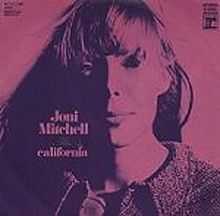California (Joni Mitchell song)
| "California" | ||||||||||
|---|---|---|---|---|---|---|---|---|---|---|
 | ||||||||||
| Single by Joni Mitchell | ||||||||||
| from the album Blue | ||||||||||
| B-side | "A Case of You" | |||||||||
| Released | 1971 | |||||||||
| Recorded | 1971 | |||||||||
| Genre | Folk rock | |||||||||
| Length | 3:48 | |||||||||
| Label | Reprise | |||||||||
| Writer(s) | Joni Mitchell | |||||||||
| Producer(s) | Joni Mitchell | |||||||||
| Joni Mitchell singles chronology | ||||||||||
| ||||||||||
| ||||||||||
"California" is a song written by Joni Mitchell that first appeared on her 1971 album Blue. It was also released as the second single from the album, as a follow-up to "Carey."
Mitchell wrote "California" while living in France but longing for the creative climate she had experienced in California.[1] In the song she expresses the depth of her longing for California by singing that if she was back in California she would even be willing to kiss a policeman, despite considering herself a member of the counterculture.[1] Like "Carey", "California" takes the form of a travelogue and uses a stream of consciousness narrative technique.[2][3] Pitchfork critic Jessica Hopper describes both songs as "how-Joni-got-her-groove-back ditties".[4] The lyrics tell of her time in France, a trip she took to Spain and an excursion to a Greek island.[2] At the end of each story in each location she expresses her desire to be back in California.[2] The character that "Carey" was based on also appears in the second verse of "California".[5][6] According to author Larry David Smith, Mitchell uses the descriptions in "California" as a strategy to demonstrate "principles associated with the Earth Mother manifesto."[2]
"California" uses a verse-bridge structure.[5] James Taylor plays guitar on the song.[1][3] Russ Kunkel provided drums and percussion.[3] According to singer Estrella Berosini, the recitative phrasing Mitchell uses on "California" was influenced by California singer Lauara Allan.[3] According to Rolling Stone Magazine critic Timothy Crouse, the song "jumps along in quick bursts", but the refrain is "flowing" with tango elements.[7] Rolling Stone Magazine critic Timothy Crouse praised the "subtlety" of the production, particularly "James Taylor's twitchy guitar and Russ Kunkel's superb, barely detectable high-hat and bass-pedal work."[7]
Critic Kim Ruehl called "California" as one of the highlights of Blue, describing it as "personal and largely sentimental."[8]
"California" was included on Mitchell's 1998 compilation album Hits[9] and on her self-chosen 2004 compilation album Dreamland.[10]
References
- ↑ 1.0 1.1 1.2 Bego, M. (2005). Joni Mitchell. Taylor Trade Publications. pp. 86–89, 98–99. ISBN 9781589792210.
- ↑ 2.0 2.1 2.2 2.3 Smith, L.D. (2004). Elvis Costello, Joni Mitchell and the Torch Song Tradition. Greenwood Publishing. pp. 48, 50. ISBN 9780275973926.
- ↑ 3.0 3.1 3.2 3.3 Weller, S. (2008). Girls Like Us. Simon & Schuster. ISBN 9781416564775.
- ↑ Hopper, J. (November 9, 2012). "Joni Mitchell The Studio Albums 1968-1979". pitchfork.com. Retrieved 2014-06-04.
- ↑ 5.0 5.1 Whitesell, L. (2008). The Music of Joni Mitchell. Oxford University Press. pp. 90, 148–150. ISBN 9780199719099.
- ↑ Marc Myers, "Joni Mitchell on the Muse Behind ‘Carey’", The Wall Street Journal, 11 November 2014.
- ↑ 7.0 7.1 Crouse, T. (January 21, 1997). "Blue". Rolling Stone Magazine. Retrieved 2014-06-04.
- ↑ Ruehl, K. "Joni Mitchell - Blue". About.com. Retrieved 2014-06-04.
- ↑ Parisien, R. "Hits". Allmusic. Retrieved 2014-06-04.
- ↑ Jurek, T. "Dreamland". Allmusic. Retrieved 2014-06-04.
External links
| ||||||||||||||||||||||||||